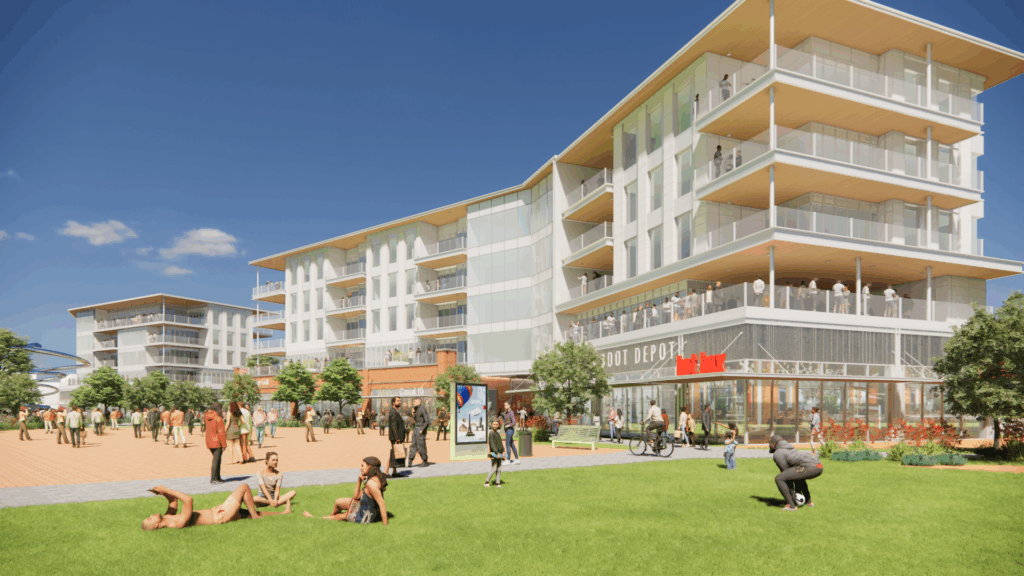Site With A History
Over 100 years, the old Riverfront Y site is a target for development

KENT DARR Aug 15, 2018 | 2:46 pm
9 min read time
2,050 wordsBusiness Record Insider, Economic Development, Real Estate and DevelopmentSeveral years ago, former Des Moines City Manager Rick Clark was in his office in city hall late in the afternoon, running through a list of development projects that were transforming the city. A Business Record reporter was trying to catch up to speed after 20 years away from Central Iowa.
When asked about the next great development site, Clark looked west across the Des Moines River and pointed to the Riverfront YMCA. “Right there.” In so many words, he explained that the aging building occupied the prime piece of real estate in the entire state.
Maybe yes, maybe no; as a downtown development attraction, it has ranked at the top for more than a decade as the last piece of prime real estate along the Des Moines River.
The old Riverfront Y site at 101 Locust St. is the center of attention these days. Hubbell Realty Co., which has owned the property since 2016 — company patriarch F.M. Hubbell also owned it back at the turn of the 20th century, but gifted it to the city — plans a $75 million condominium project. The federal government says the site is the prime spot for a $140 million courthouse.
Odds are that the federal government will have the final say. But it would be foolish to count Hubbell Realty out of this or any other development game. President and CEO Rick Tollakson said last week the company will fight “tooth and nail” for its project by the river.
The Coliseum
The two acres of property along the river between Locust Street and Grand Avenue has drawn attention since the turn of the 20th century.
In 1907, with civic and business leaders wanting to add to the city’s crowd-drawing appeal, F.M. Hubbell said he would give up the property for construction of a coliseum, because the city had surpassed the “auditorium stage,” according to a newspaper article cited by historian William B. Friedricks in “Investing in Iowa: The Life and Times of F.M. Hubbell.”
Obviously, the property is a place to harbor big ideas.
The Des Moines Coliseum was under construction during an era that saw the creation of seven public buildings that make up the city’s Civic Center Historic District on the east and west banks of the Des Moines River. Those buildings include City Hall, the U.S. post office, and, since the late 1920s, the federal courthouse that, according to the U.S. General Services Administration, has outlived its usefulness.
According to Friedricks’ book, the Coliseum opened in November 1909, hosting the Iowa Corn Growers Association convention. It did have a storied life, hosting presidents and touring celebrities. When it opened, the building was said to be flame-proof. But it burned to the ground in August 1949.
The Riverfront YMCA was built in its place in 1957.
The building showed its age by the turn of the 21st century. The rooms lacked air conditioning and smoke detectors. YMCA officials began looking for a site for residences and considered a possible rehab of the fitness center, which “was obviously tired and needed a big redo,” Des Moines Deputy City Manager Matt Anderson said.
“With the residential move discussion in full swing, the Y started searching for a new location and studying rehabbing the existing health club a couple years before the Knapp-brokered land swap took place,” Anderson said.
More about the great land swap of 2012 later.
The search for a new site was not without controversy. A proposal to relocate housing and a fitness center to Dean Avenue generated opposition from east-side residents. In 2011, the Y had built a new residential facility near Ninth and Cherry streets.
In 2006, developer Jon Garnaas, who was working with the YMCA on its Clive wellness center, presented plans for for the Riverfront Y site that included a hotel, restaurant, 11-story residential tower and offices. That effort persisted for about five years, but disappeared with the collapse of Garnaas’s development business.
The land swap
A big redevelopment effort occurred in 2012, when real estate developer and legendary arm-twister Bill Knapp led the charge for a land swap of downtown properties that had future development of the Riverfront Y as one of its driving forces.
Knapp, chairman emeritus of Knapp Properties Inc., got some friends and fellow developers involved, he told the Business Record at the time, including Jim Cownie and Tollakson.
The idea was to relocate the Riverfront Y’s fitness center; find a productive use for the Polk County Convention Complex at Fifth and Grand avenues; provide new, or at least renovated housing for the Polk County court system; and once and for all secure property for a convention center hotel. All of this was to occur under the watch of a group of business and civic leaders organized under the nonprofit Des Moines Redevelopment Co.
Des Moines Redevelopment’s articles of incorporation were filed on Aug. 22, 2012, by Des Moines attorney Steve Zumbach, who was told to put the legal trappings on the organization. Property deals were about to be filed.
The call came from Gerry Neugent, at the time president and chief operating officer of Knapp Properties Inc.
“There were meetings going on with the city and different people for years talking about having an organization, like in the old days they had the Des Moines redevelopment corporation,” Neugent said. “It just wasn’t getting anywhere. Bill got involved and it just got traction.”
Knapp said every project needs a leader; that’s just the way things get done.
“Anything that happens, you need someone to be the leader who gets it going because everyone is busy,” Knapp said. “No one person gets anything done. This is a great city to go to for support for a project that is for the good of communities.”
When Knapp got involved, there were big issues standing in the way of downtown development plans.
PROBLEM ONE: The aging Riverfront YMCA was in need of new downtown digs that would help boost its membership and help it draw young professionals who worked downtown.
PROBLEM TWO: Polk County’s court system had outgrown its historic, but cramped, courthouse at Fifth Avenue and Mulberry Street. Polk officials needed help finding space and rehabilitation dollars to expand.
PROBLEM THREE: The city needed and wanted a convention center hotel to adorn the Iowa Events Center.
A solution to all three problems seemed obvious, to Knapp at least.
The former J.C. Penney building is conveniently located due north of the Polk County Courthouse on Fifth Avenue. At the time, it was owned by Wellmark Blue Cross and Blue Shield.
“The first thing that had to be done was that the county needed that building for expansion. It took a couple of years to get this done,” Knapp said. He noted that Wellmark Chairman and CEO John Forsyth was a tough negotiator.
Knapp found himself in an old-fashioned real estate transaction. This ended with Wellmark deeding the J.C. Penney building to Polk County for $500,000, provided that Polk County would give its abandoned Polk County Convention Complex at Fifth and Grand avenues to Wellmark. Wellmark then sold “the Plex” to the YMCA for $4.5 million. A big perk: Wellmark got the naming rights to the new Y, a value that Knapp figured might be priceless. Wellmark also deeded a nearby parking lot to the YMCA for the construction of a 50-meter swimming pool.
“This Y is really something that will set the stage,” Knapp said at the time.
Tollakson said at the time that finding a home for the YMCA was a key to making the land swap happen.
“We’re taking the Plex and turning it into a major tourist attraction,” said Tollakson.
Running a close second in elevating the downtown profile was the leadership that put together the purchase of land for a convention center hotel. In the first of the deals that made up the land swap, Des Moines Redevelopment bought the former Allied Insurance Co. building at Fourth and Park and later sold it to Polk County for construction of the convention center hotel.
“You had all of these things working independently of each other, and the group said, ‘How can we make all of this happen?’ ” Tollakson said.
There was a complication. Des Moines Redevelopment promised to backstop the eventual sale of the Riverfront Y property, which was still owned by the YMCA, for $4.5 million if another buyer wasn’t found.
The property was listed for sale in October 2013 by CBRE|Hubbell Commercial for $5.5 million.
Local and out-of-town developers were said to be interested in the site. A Texas investor presented what amounted to the old Garnaas concept. Word was that a Wisconsin developer was interested. Local developers considered preserving the residential tower, but couldn’t pencil out the finances of converting small rooms with short ceilings to upscale digs that would draw pricey rents. There were other concerns.
Knapp envisioned rents up to $2,500.
Real buyers were hard to find.
In December 2014, the Riverfront Y closed for good. In October 2015, it was demolished.
Back to Hubbell
Hubbell Realty decided to put the property under contract and closed on a purchase for $4.77 million in October 2016.
The purchase was crucial to Des Moines Redevelopment, Neugent said.
“Hubbell did Des Moines Redevelopment a favor,” he said. “It would have collapsed Des Moines Redevelopment insofar as taking on a project that big and holding it as long as it takes to find a buyer and developer. When Hubbell came in, they really bailed us out.”
And took some heat.
Hubbell’s initial development plans got a cool reception at City Hall; they didn’t represent the icon the observers, including Tollakson, envisioned for the site. But, for the company, they made financial sense.
A Chicago investment group said it had a better plan. The group shifted the focus to partnering on a high-rise tower; then it left town and returned its focus to an upscale student housing project in Iowa City.
In July 2017, after reviewing three sites, the federal government said it wanted to build the new federal courthouse at the site of the old Riverfront Y.
In August 2017, the Des Moines City Council and Hubbell agreed to a plan they hoped would dash that idea. Hubbell agreed to sell the site to the city for $5.2 million if it could not come up with a development plan. That agreement was set to expire Aug. 28.
Earlier this year, Tollakson said he was working on a plan for a condominium project. The condos would be in the neighborhood of $1 million. Tollakson, among others, was convinced that luxury units, for rent or for sale, were the missing component in downtown housing.
On Aug. 7, Hubbell released plans for three seven-story buildings. Initial plans called for 115 condominiums priced between $500,000 and $1.5 million, depending on size, location and finishes. That plan could generate about $3 million a year in property tax revenue.
On Aug. 8, the General Services Administration said that after reviewing the initial sites, plus one, it was still committed to the Riverfront Y site for a new federal courthouse.
Hubbell has vowed a fight that it knows it could lose. If a purchase price isn’t reached, the federal government can take the property through eminent domain. A federal judge or jury could settle the question of fair market value.
The old federal courthouse could be sold for private development. The new federal courthouse would not generate property tax revenue.
It’s a site with a history, to be sure, and its future remains unclear years after Rick Clark’s prediction.
Riverfront Site Timeline
1907
F.M. Hubbell gifts site to city of Des Moines for the Coliseum.
1909
Coliseum opens with Iowa Corn Growers Association Convention.
1949
‘Flame-proof’Coliseum burns to ground.
1957
Riverfront YMCA built.
December 2014
Riverfront YMCA closes for good.
October 2015
Riverfront YMCA is demolished.
October 2016
Hubbell Realty purchases site for $4.77 million.
July 2017
Federal government says it wants to build a new federal courthouse on the site.
August 2017
Hubbell agrees to sell site to city for $5.2 million if it cannot come up with development plan.
Aug. 7, 2018
Hubbell releases plan for three seven-story buildings.
Aug. 8, 2018
General Services Administration reaffirms commitment to Riverfront Y site for courthouse.









